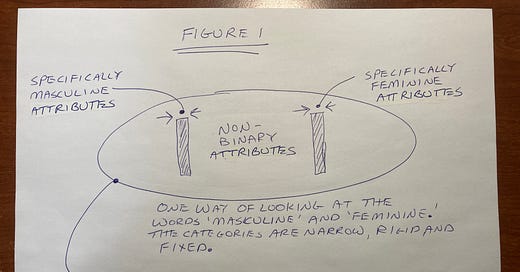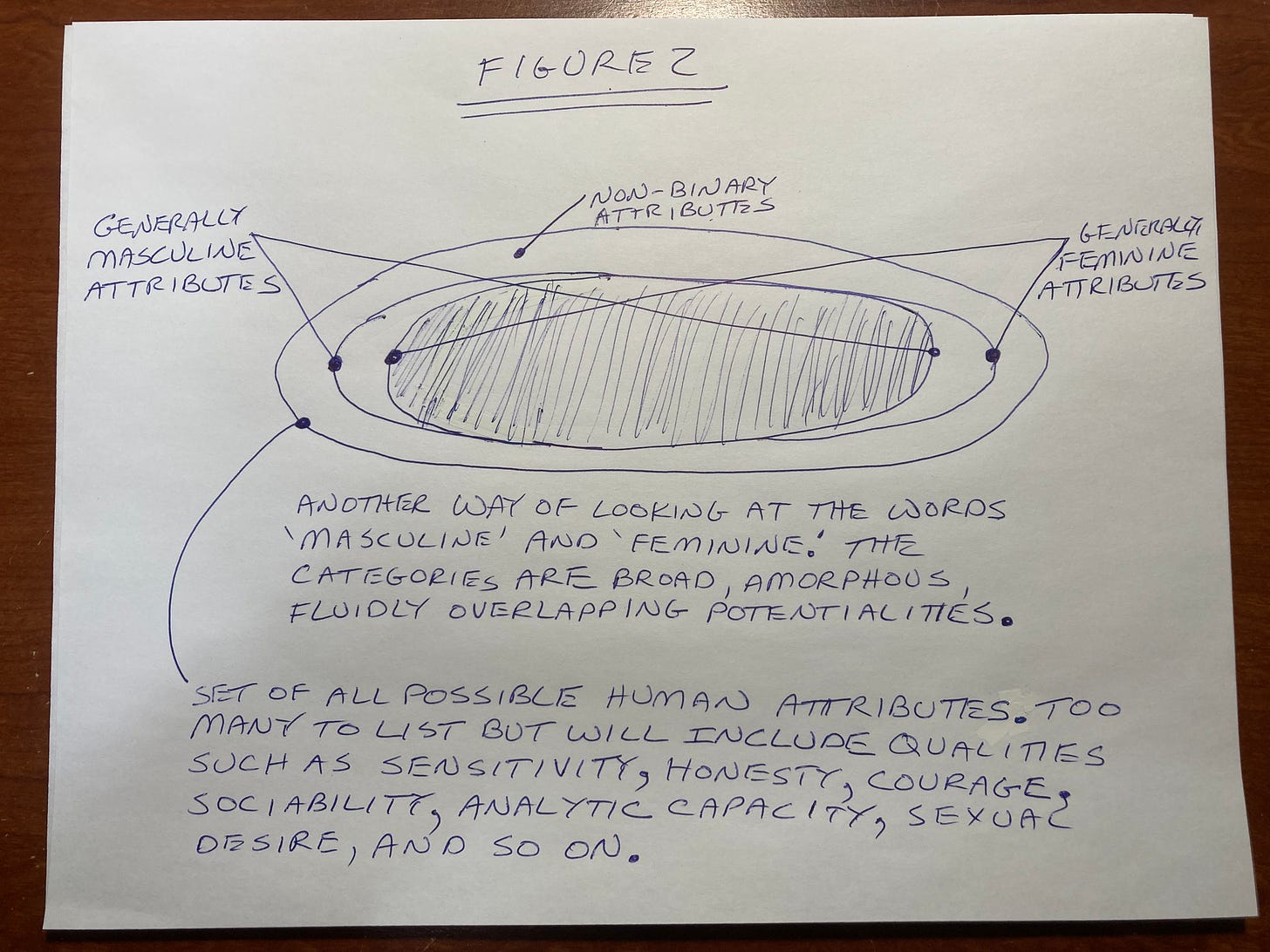Dear Progressive Friend
Because you are a mature person possessing emotional fortitude, I ask you to suspend judgment for a moment. Hear me out. This letter is not an attack on your identity, and nor is it what it appears to be on the surface. I write this because I love you, but if we are not free to express our independent thoughts then we are not free at all. Stay with the trouble, please.
Some background for the lucky souls who are offline and analog: On video calls and social media, it’s become conventional in progressive circles to type third-person pronouns beside your name. For example, in the box with the video image of your face you might write “John Doe (he/him)” or “Jane Doe (she/her)” or (they/them), (she/they), (he/they) or any other variations intended to convey gender expression.
I will argue against the practice, but while I think it’s misguided and brings unintended consequences, I don’t think your preference for referring to yourself with third-person pronouns comes from your heart being in a bad place. However, nor does my argument against. “Both/and,” as we say.
I am not saying what you should do or think or feel, even if you are passionately for pronouns. My wish is simply to be free to: a) not think of myself in terms of an explicit, Self-Conscious, third-person pronoun configuration, b) not pay much attention to your explicit, Self-Conscious, third-person pronoun configuration, and c) generally keep some aspects of life and relations implicit, amorphous and fluid. The latter (c) is what I argue for when I argue “Against Pronouns.”
~~~
I wanted to call this letter “Against Explicitness.” Pronouns are just one example of the modern drive to render the world explicit and defined. Whether it’s by accident or design, “wording the world” is the best fit for machine learning, while that which is implicit or undeclared is useless to it. The more human expression becomes an exercise in box-ticking and off-the-shelf category selection, the more we become like punch cards that AI can process. For machine learning it makes no difference how well our identity boxes reflect ‘reality,’ as long as they are quantifiable and explicit.
If our videocall is about physics, gardening or music it shouldn’t matter if you’re gay, right? It doesn’t to me. That particular aspect of you, your sexual nature, has no reason to be foregrounded in our conversation, putting physics, gardening and music in the shade. Same with gender. We can show who we are instead of telling. We can resist the drive of modernity to reduce us to avatars of personal branding.
My feeling is that future generations (perhaps by next week) will back look on this innovative use of pronouns as quaint and naïve. It might resemble Victorians searching for ghosts and spirits with electromagnetic devices, the main difference being that our device is postmodern language deconstruction. This is the essence of my humble opinion: an indifferent shrug for what is an abstract, rootless, disembodied fad for Self-Consciously pointing to yourself with third person pronouns.
~~~
Even at the surface, applying third-person pronouns to your own self is problematic. When pronouns are rendered verbally explicit a person typically says, ”My name is Jane Doe and I use X and Y pronouns” or “My name is John Doe and my pronouns are X and Y.” Both are interchangeable and mean the same thing, but what is that thing?
First, unless you refer to yourself in the third person you most definitely do not use X and Y pronouns. You just don’t. The statement is factually incorrect and, not to be too unkind, absurd at the most basic level of coherence. Second, since this mostly occurs on video calls and social media, no one else will use your pronouns either. You’re in the same room (so to speak) and only rarely will anyone use your third person pronouns, as if you weren’t there.
Since we are not third-person entities to ourselves, the statement can be inferred to mean something like, “When other people refer to me in the third person, I want them to use the X and Y pronouns that reflect my Self-Conscious gender expression.” (This assumes there is more to the practice than ingroup signaling, in which case there would be nothing of substance to explore.)
My pronouns, and yours, are I and me. But I and me, and you and you, are not gendered, so nothing stands out there to hang your hat on.
If pronouns are important to your sense of self and being seen may I suggest two things: 1) it is more difficult to see you as your one-of-a-kind living soul with your explicit category left unblinking in my field of vision, and 2) Your pronouns can make a claim on my attention, which I am free to engage with or not, but a moral claim does not exist.
~~~
There are different ways to process words describing attributes. At one extreme we can choose narrow, rigid and fixed definitions. For example, analytical, aggressive and domineering can be “coded” (as our ultra-modern, techno-infused, academic lingo now puts it) “masculine,” while empathic, nurturing and receptive can be “coded” “feminine.” But while computer programs are coded because machines only process explicit instructions, humans evolved the capacity to process implicit meaning.
Words describing attributes and qualities contain multitudes, even without embodied modifiers like tone, stress and gesture. What is “red,” for example, in the absence of a particular instance? A word like “sensitive,” need not be “coded” either masculine or feminine. It is a basic human quality, or more likely a quality of all living beings.
The following crude, far-from-definitive, Venn diagrams will hopefully illustrate at a glance what I mean by narrow versus expansive word processing:
Even words in apparent binary opposition like “masculine” and “feminine,” as in my example, can be conceived broadly. I did not place the very short list of human qualities within the diagrams because there are no correct locations for anything. I could have named ‘hunter/killer instinct’ and put it on the extreme left masculine side in Figure 2, for instance, but you might feel it belongs elsewhere. The salient point is that most, if not all, human qualities land somewhere in the overlapping region.
~~~
These different ways of processing words have a complement in Zeno’s paradoxes, such as the famous one of Achilles and the tortoise. The slow-moving tortoise gets a head start in the race and the swift-footed Achilles can never catch up because of the following logic. First Achilles must get to where the tortoise is at this moment, but by the time Achilles gets there the tortoise has moved ahead to a new location. Then Achilles must reach that next location, but by that time the tortoise has moved ahead again. And so on ad infinitum. By this logic, Achilles will never catch the tortoise. Hence the paradox: We know intuitively this isn’t right and that Achilles will indeed overtake, but the logic is compelling if you try to resolve it within those constraints.
But if we process motion and time in terms of flow, rather than increments, then there is no paradox. If we imagine the flow of the tortoise’s motion and the flow of Achilles’ motion, in context of the flow of time, then of course we see instantly that Achilles will overtake. This is how motion and time really are and how our senses are wired to process them. The paradox only arises from trying to stamp a series of static increments onto a dynamic, fluid flow.
Zeno’s paradoxes are discussed by greater thinkers than I. I bring it up because I perceive a parallel with the ways we can choose to process words. The narrow, fixed and rigid view of a word’s definition maps onto the incremental approach. It leads to “problematic” issues with language that don’t exist outside narrow definitions. A broader view of attribute definition, conversely, maps onto the image of flow since, with multitudes, shades and ranges of meaning, no explicit resolution is required. Metaphorically, the waveform does not collapse.
It is my contention that much of the polarization around pronouns arises because of a lack of understanding, or acknowledgement perhaps, of different ways of processing words. On the one hand, it would be great if someone more academic than I could back up this contention with more than a couple rough sketches and a personal letter. But on the other hand, academic dissection of gender created this semantic confusion in the first place. It’s a problem that could only exist within a confluence of postmodernist thought and machine learning, birthed by the former and raised by the latter.
I believe the unfolding AI era will increase the pressure to render our interiority in ways that can be processed by machine learning. But we can just say no to the dopamine hits that come from selecting the correct category boxes in digital drop-down menus of human expression. We can rage against the dying of the implicate order.
Ever Yours Jeff V





